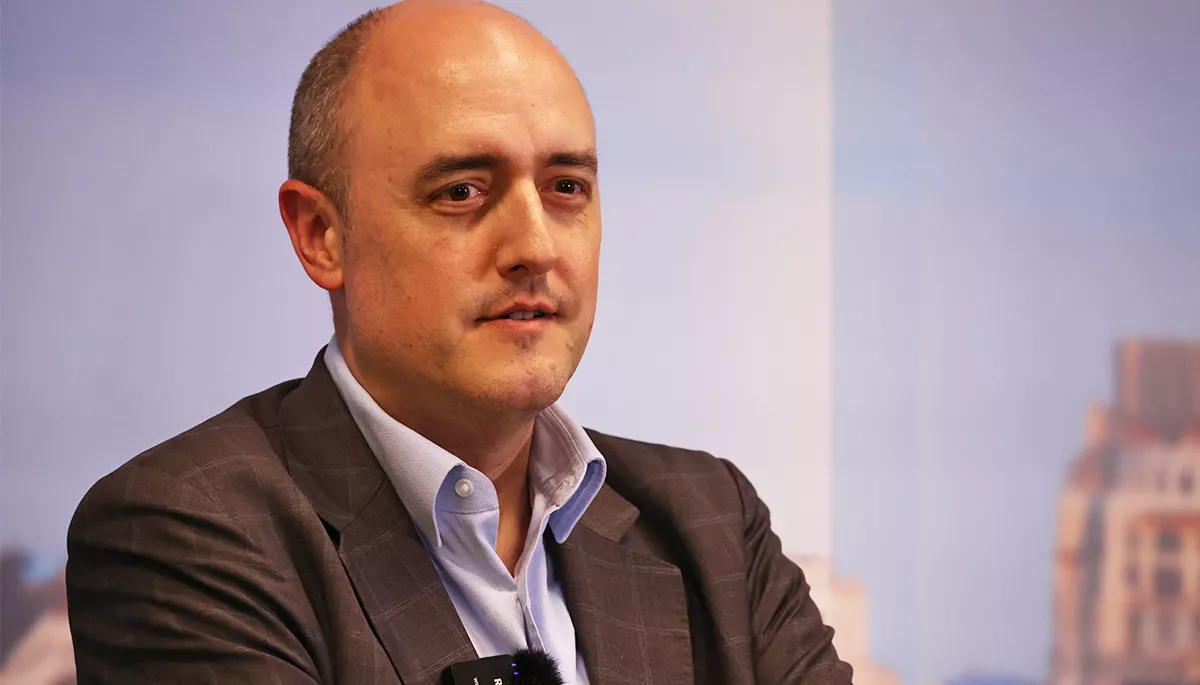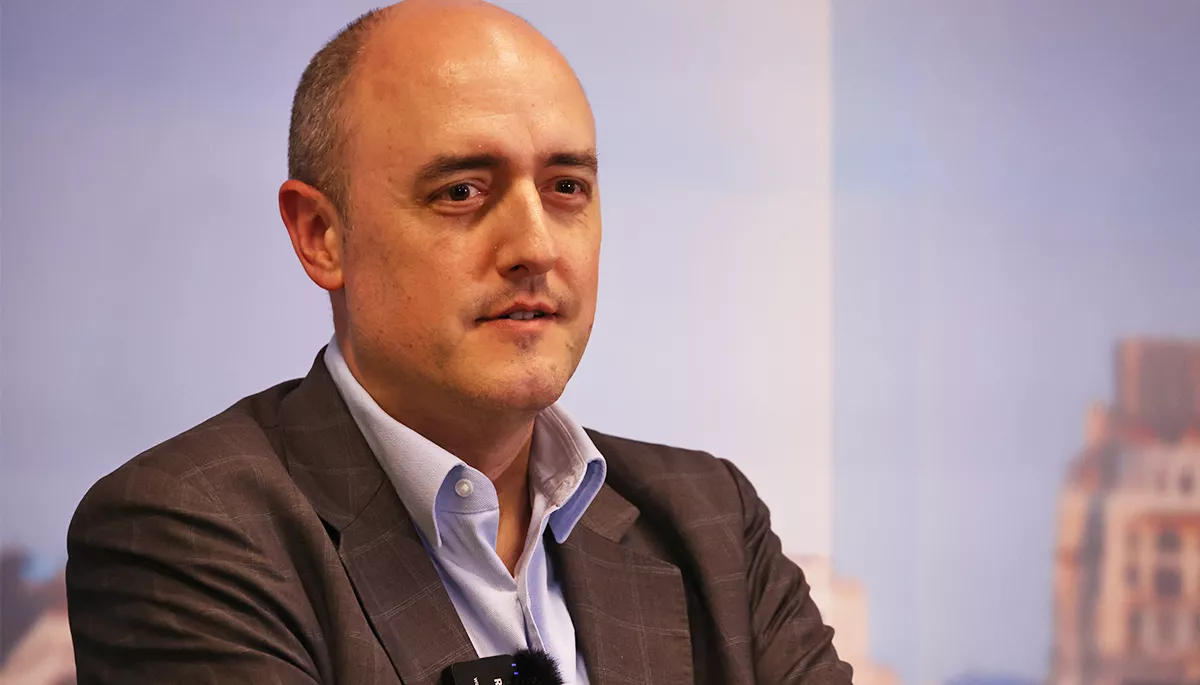
Jamie Fly, RFE/RL: We have experienced a significant surge in traffic from Russia to our Ukrainian language sites
Jamie Fly, RFE/RL: We have experienced a significant surge in traffic from Russia to our Ukrainian language sites


Українською текст читайте тут.
A bit more than a year has passed between this and the previous interview of Detector Media with President and CEO of Radio Free Europe / Radio Liberty. And a series of events that would be enough for a lifetime. Journalists from the Moscow bureau, who had moved to Kyiv in 2021, relocated to Riga this year. During this time, the journalists of the Kyiv bureau also managed to work outside the Ukrainian capital.
Read this interview to get known about the delivery of content to closed environments, the speed of the Kremlin's occupation of the information space in the occupied territories of Ukraine, and the flow of media refugees from Russia.
– I was recalling our meeting in May last year in preparation for this interview. At that time, great perspectives opened for your Kyiv bureau: it was well-equipped, it became home for the staff from Moscow bureau, and it started producing several programs of Current Time TV channel. It could have even become a hub for content production and broadcasting for Belarus and Russia. But everything has changed this year. I know that you had to close Kyiv bureau on the eve of the invasion, on February 22, and your Ukrainian team moved to Lviv and Prague. How is your editorial team working currently? Did they come back to Kyiv? Did you open your office again? Did you move back the equipment if it was relocated in February?
– I want to start from the first part of your question. Yes, it is frustrating because Ukraine is obviously a vibrant democracy. It is a place that is very open to independent journalism. That is why we had a hope that Kyiv could be a center for journalism not just for Ukrainian people but for many of Ukraine's neighbors where governments detain journalists, trying to silence them. So, we had set up a bit of a hub in Kyiv for regional journalism.
But given the war, we have not been able to keep producing our journalism for other countries from Ukraine. We had to take a different approach of setting up new offices at the Baltic states: in Vilnius for Belarus, in Riga for Russia. And until the security issues in Ukraine are addressed, I do not think we will be able to resume journalism inside Ukraine for other countries in the region.

RFE/RL advertising on the streets of Vilnius
But we have been able to continue the amazing work of our Ukrainian service for the Ukrainian people. We have many brave journalists who have stayed in Ukraine throughout the conflict at all phases, at great personal risk to themselves to do that reporting about the war. We have frontline journalists who are covering the fighting of military people every day and profiling the plight of Ukrainian civilians who are caught up in the conflict. We have journalists who are also doing reporting projects now aimed at many of Ukrainians who had to leave the country and are now refugees in other parts of Europe.
So, we have been able to continue all our journalism throughout the conflict, and at that time we have had to move people between different locations. But now, at this point, we are back in Kyiv and can do all the production that we need to do from our Kyiv bureau. But we are always watching the security situation very carefully and doing everything possible to keep our journalists safe. This is incredibly difficult in a situation where every part of the country is under that risk – as we learned when we lost one of our producers in late April, Vira Hyrych, who was killed in her home. Giving the Russian tactics, nowhere in Ukraine is completely safe, and it influences our decisions about where to employ our people.
– Your experience in delivering content to Russia and Belarus could be useful for occupied territories of Ukraine, including newly occupied. I read a piece of news about your broadcasting on medium waves jointly with Deutsche Welle. I also read news about the establishment of RFE/RL innovation center in the Baltic states which is dedicated to countering disinformation and avoiding internet censorship. Could you share any results of work of this center?
– Our approach to reaching audiences in Russia really applies to Belarus and other closed environments where it is becoming difficult to report the truth without intervene of government censorship. We try to make sure that we are reachable on all relevant platforms. We act under extreme digital censorship and blocking of websites that requires audiences to use new tools like VPNs or mirror websites. And we are doing all that. But we also need to make sure that if radio is an option that people want to pursue, they at least have the access to content on radio. And we have satellite capabilities to reach audiences if they have satellite receivers. We are also active on the social media platforms that have not been blocked including YouTube and Telegram.
We do have a radio broadcast that reach into parts of Russia. Deutsche Welle is now also using one of the same transmitters for some of its broadcast daily. We are looking at options that possibly increase the reach that we have into Russia using radio transmission. And we are also looking at that for the newly occupied areas of Ukraine. We have had specific radio programming for Ukrainian audiences for many years, focused on Eastern Ukraine and the Crimea. We are looking at opportunities to expand those and make sure that their content is relevant for people who are living now, under Russian occupation, in these areas that were recently taken. Digital is also a part of that because once the internet is restored after fighting in the newly occupied areas, the Russians are systematically pulling them into Russian internet infrastructure so that they can have more control over content. And they are applying to the occupied areas the same sorts of digital censorship that we are seeing in mainland Russia. We are making sure that we can target our VPNs and other technical tools to those Ukrainian citizens there who still want to access uncensored material online.
– Your colleagues in Prague told me that Ukrainian service is very interested in partnerships with large Ukrainian media companies who can help to deliver content to the territories under Russian occupation. They are also interested in partnership with Ukrainian government. And frankly speaking, we were discussing if Ukrainian government currently has the strategy of broadcasting to newly occupied territories. We understand that the government is extremely busy with many tasks. But what are your impressions?
– We have had a good dialogue with various Ukrainian officials about the challenge of reaching people in newly occupied areas. Obviously, the Ukrainian government must first and foremost focus on fighting a military conflict. However, I am convinced that there are many people in Ukrainian government who are taking the issue of reaching people under occupation seriously and pursuing innovative projects.
We are always open to partnerships. Obviously, we have to make sure that any content that we air on any of our streams or channels meets our standards: that is fundamental starting point when we pursue partnerships with anyone. We are already sharing some of our content with other Ukrainian outlets, including the government-sponsored channels. In particular, we make some of our reporting where we have journalists that they do not have access to. We do exchange programming and make them available to a wide variety of actors in Ukraine.
I think the biggest challenge everyone faces is that the Kremlin has pursued a methodical approach to cut off as many forms of access to factual information as possible. They want to narrow the options to a very limited stream of information – to that stream of which they will exert ultimate control. We have seen that with the Russian public inside mainland Russia. And I think that is the goal in every part of Ukraine that they are able to occupy. I think these partnerships are helpful because we can come together and unite our resources to make sure that we can provide a variety of options for people who want to get access to independent information.
– Your colleagues also said that it took several years for Russia to clean up the information space in the occupied Crimea and could take much less time in Kherson region. Do you agree with such an observation?
– The challenge as I have seen it in the newly occupied territories: the fighting is much more extreme than in Crimea in 2014. So, you have populations who are literally being caught in the crossfire of fighting or getting their homes shelled. And the reporting that I have seen often emphasizes that there is a lot of disinformation being pushed from the Russian side about the fighting itself, about who is doing the shelling and targeting the specific areas. Obviously, you have had similar challenges since 2014 all along the frontline in Donetsk and Luhansk. But the Crimea situation just played out very differently: it had to take time on the information side to pull people over the Kremlin narrative, but the population was not being thrust into the center of an active conflict.
There is a good New York Times reporting about areas where the Internet is just being knocked out. So, people do not even have digital access to information in the middle of a conflict and conspiracy theories swirl through occasional radio reports. It is a very difficult information environment. But I think because we do have a history of having audiences in these regions, our journalists know those regions very well, we are able to at least provide some factual information. My goal is just to make sure that people can still access our content despite the challenges on the Internet, even though there are limited radio opportunity options in some of those areas.
– I have recently observed a quarrel in Riga between the management of Meduza and Ukrainian media representatives. They asked Meduza why they label their content with the foreign agents marks if they already live in Latvia, work from Latvia, and it looks like they could not come back to Russia. And Meduza answered something like they still need to pay their mortgage. Your company refused to put these marks and you had to leave Russian market in the end. And currently we see the case of bankruptcy of your legal entity there. Could you prevent it?
– You are right, we have consistently refused to label our individual content. We had chosen to suspend our operations and our physical office in Moscow shortly after the beginning of the invasion of Ukraine late February, just because of the risk to our journalists. And we also knew that Russian authorities were going to put our entity into bankruptcy. Under Russian law there was not a lot that we could do to prevent them. We have outstanding fines that we will not pay to the Kremlin for our refusal to comply with the law.
But the reality is that it does not really matter ultimately that our entity is at bankruptcy. We still have brave individuals, both inside Russia and outside of Russia, who can do reporting using sources and information coming from inside the country about what is happening in Russia. They are obviously able to do reporting about what is going on in Ukraine and elsewhere in the region for Russian audiences. And it is important to note that our Russian audiences are still higher now than they were in early February, before the war. The war has brought more audiences to our content.
All the Russian outlets depend on their own decision on the labeling issue. I think in retrospect, we should all now realize that this labeling requirement was part of a long-term plan by the Kremlin to completely close the information space in Russia, to drive as many independent Russian media outlets out of the country, into bankruptcy and oblivion, as possible. I think to a large extent they are failing because of the technological tools such as VPN. There are Russians who still want to get access to independent information.
And to put a note, they are not just coming to our Russian sites. Our Ukrainian service has experienced a significant surge in traffic from Russia to its Ukrainian language sites. Russians inside Russia realize they cannot get the truth from their own government and from government back sources inside their country.

– You have mentioned the process of driving independent Russian media outlets out of the country. Did you notice the news from Latvian security service? There are 23 Russian media outlets in Latvia already and they have security concerns because of this.
– There is a challenge everywhere about ensuring that those who have left Russia are doing so with the right intensions and that flow of refugees have not been exploited by the Russian government. We operate in all kinds of districts across the region, we take security very seriously and see that many governments are focused on this. I think there is also a danger which may be related to the Latvian concern too that some Russian propaganda outlets may try to join that exodus and may try to set up new offices outside of the country and act as if they are independent. We have seen that the EU take significant steps to target Russian propaganda outlets operating and broadcasting inside the EU. And we are watching these developments very carefully because our outlet operates in different parts of the EU and to also ensure the safety and security of our journalists.
– You have already mentioned brave journalists who continue reporting from Russia, Belarus, and occupied territories of Ukraine. Unfortunately, new names of your journalists appeared among those who are persecuted by the authorities in their countries during this year. And the old cases of persecuted journalists are not solved. How many journalists from RFE/RL are under pressure by the authorities in this region? And do you have any hope to help to release them?
– It is an important question for us. Our journalists face all kinds of harassment in many countries. The daily threats that they face in a war zone are the most extreme. But beyond these threats the most extreme are related to detention. We have four journalists from RFE/RL who are currently detained: three in Belarus and one in Russian occupied Crimea (the interview was recorded before it became known about the release of the Belarusian journalist Oleg Grudzilovych. Currently, two RFE/RL journalists remain jailed in Belarus: Andrey Kuznechyk and Ihor Losik. – DM). We have not seen much of a change from the Lukashenko regime. Its approach to its own citizens and to the information space there got more extreme: criminalizing journalism, targeting even audience engagement with certain content. We have had some reports of audience members being sentenced for up to ten days in prison just for viewing our website inside Belarus, so that is a significant challenge.
We were doing everything possible to try to explore options to get our three Belarusian colleagues released. As for Vlad Yesypenko who was reporting from Crimea last year before the war, picked up by the FSB and then sentenced, during both of my trips to Ukraine I have raised his case with the government and talked to officials in the Zelensky’s team. I am strongly urging the Ukrainian government to prioritize his release. There are ongoing conversations between Ukraine and Russia about prisoner exchanges. Vlad is not a soldier. There are a lot of compelling cases right now in Ukraine, because of the use of kidnapping, exfiltration by the Russian forces. But I think it would send a strong signal about the Ukrainian government support for independent journalism if journalists like Vlad was prioritized as part of those prisoner exchanges.
Beyond that inside Russia the major challenge remains the use of the foreign agent law against individual journalists. We have had almost 30 of our journalists labeled as individual foreign agents which has all kinds of consequences for them as they try to do their work. And we are very concerned about additional threats to journalists because of a creeping trend inside Russia similar to Belarus of criminalizing all journalism, criminalizing even the consumption of certain types of journalism. That is the danger in this current environment inside Russia as the Putin regime maybe gets more concerned about stability, about the public's response to a long-running unsuccessful war.
We will continue to do everything we can to stand up for our journalists and to take action when we need to try to protect them.
Photo: Detector Media, RFE/RL












